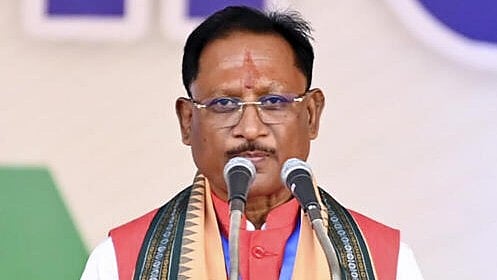
Chhattisgarh Chief Minister Vishnu Deo Sai
Credit: PTI Photo
Raipur: Having lost his father at the age of 10, Vishnu Deo Sai had no time to indulge in childhood. Being the oldest of four siblings, he immediately took on the responsibility of the family and had simply no time to play or have fun.
Perhaps that's why, he says, he never nurtured personal pursuits, and now finds solace only in social work.
In an interview to PTI Videos on Sunday, Chhattisgarh Chief Minister Sai slipped into a reflective mood as he talked about his family and his political journey from the time he was elected a village Panch as a callow youth.
After five years he became the sarpanch at the age of 26 in 1990. "I had never imagined I would become the Sarpanch," he said.
But then the rise continued. Sai was elected as MLA thrice and MP four times.
He reached the pinnacle of power in 2023 when he was elected the first tribal chief minister of Chhattisgarh.
“While former Chief Minister Ajit Jogi also is said to have that privilege, his tribal status remained in dispute till his demise," he said.
Speaking about his childhood, Sai said, "I did not get a chance to play as I lost my father when I was 10 years old. After his death, the responsibility of the entire family fell on my shoulders because I was the eldest among four brothers." "My youngest brother was then two months old. My father had three brothers and they all lived in different villages. I had to take care of my younger brothers and mother as well as farming activities in our village Bagia (Jashpur district).
"I then decided to educate my brothers by doing farming activities so that they can become successful in their lives. I never imagined becoming a sarpanch," he said.
Sai said he quit his college studies and became a panch in his village after local people asked him to take up the responsibility.
"After seeing my work for five years, they elected me as Sarpanch (village head) unopposed in 1990,” he said.
Within six months of becoming sarpanch, the state assembly elections took place and he was nominated as a BJP candidate.
"I was then 25-26 years of age and was still learning. I even told the party that 'I do not deserve to be an MLA'. I contested the poll and won from Tapkara seat (in Jashpur district) in erstwhile Madhya Pradesh in 1990, marking the beginning of my journey as an MLA," he said.
He was again elected from Tapkara for a second consecutive term in 1993. In 1998, he unsuccessfully contested the assembly polls from the adjoining Pathalgaon seat.
Later he was elected as an MP from Raigarh Lok Sabha constituency four times in a row - 1999, 2004, 2009 and 2014.
After the Narendra Modi government was formed at the Centre in 2014, he was appointed as Union Minister of State for Steel and Mines.
He served as the BJP’s Chhattisgarh chief from 2006 to 2010 and then from January 2014 to August 2014.
After the BJP lost power in the state in 2018, he was again given the responsibility to lead the party as state chief in 2020.
“I entered into politics for 'janseva' (social service). It feels good to listen to people and try to solve their problems. I feel very satisfied when I get the ailing people cured.
"I never imagined that I would become a politician. Whatever responsibilities I was assigned I discharged them with full dedication and honesty,” he said.
Sai recalled how his residence in Delhi was referred to as "mini AIIMS” when he was an MP.
He said that when the late BJP leader Dilip Singh Judeo used to come to his official residence in Delhi, he would say "'you have made your home a mini AIIMS' after seeing the house full of relatives of the persons admitted in AIIMS Delhi.” "When I was MoS (2014 to 2019), I used to arrange meals for 70-80 people daily whose kin were admitted to hospital.
"Even after becoming CM, I have set up a Kunkuri Sadan here where people from all over the state who come for treatment in Raipur are provided different kinds of assistance and guidance,” he said.
Sai's initial lack of interest in politics was despite the fact that he comes from a deeply political family. His grandfather was an MLA (nominated) in the undivided Madhya Pradesh.
“My family has been in politics since the beginning. After independence, my grandfather late Budhnath Sai was a nominated MLA from 1947 to 1952.
"My uncle (son of his grandfather’s younger brother), late Narhari Prasad Sai served as an MLA thrice and was elected as MP (1977-79) and served as Union minister of state in Janata party government,” he said.
The elder brother of his father, late Kedarnath Sai, was also elected as an MLA from Tapkara as Jan Sangh member. "Later my cousin Rohit Sai was also elected as an MLA," he said.
As he climbed the ladder of success, Sai's humble nature has been his strength.